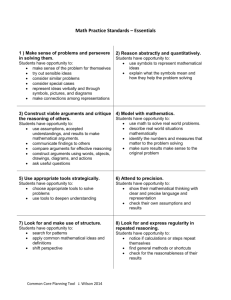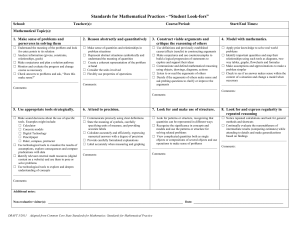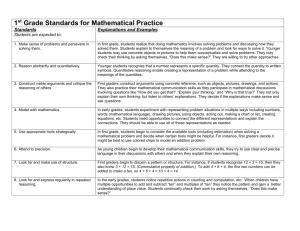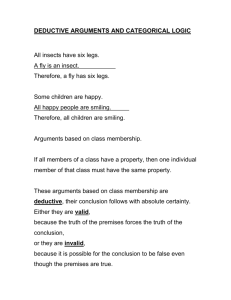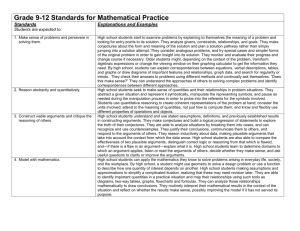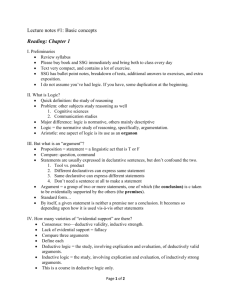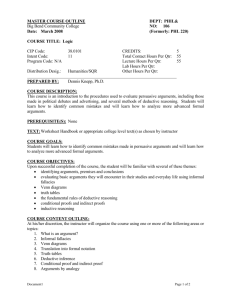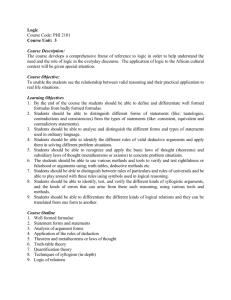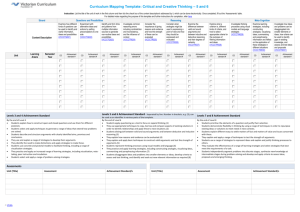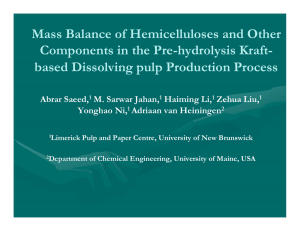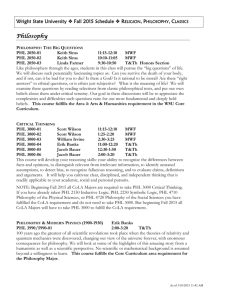Second Reading - Cal Poly Pomona
advertisement
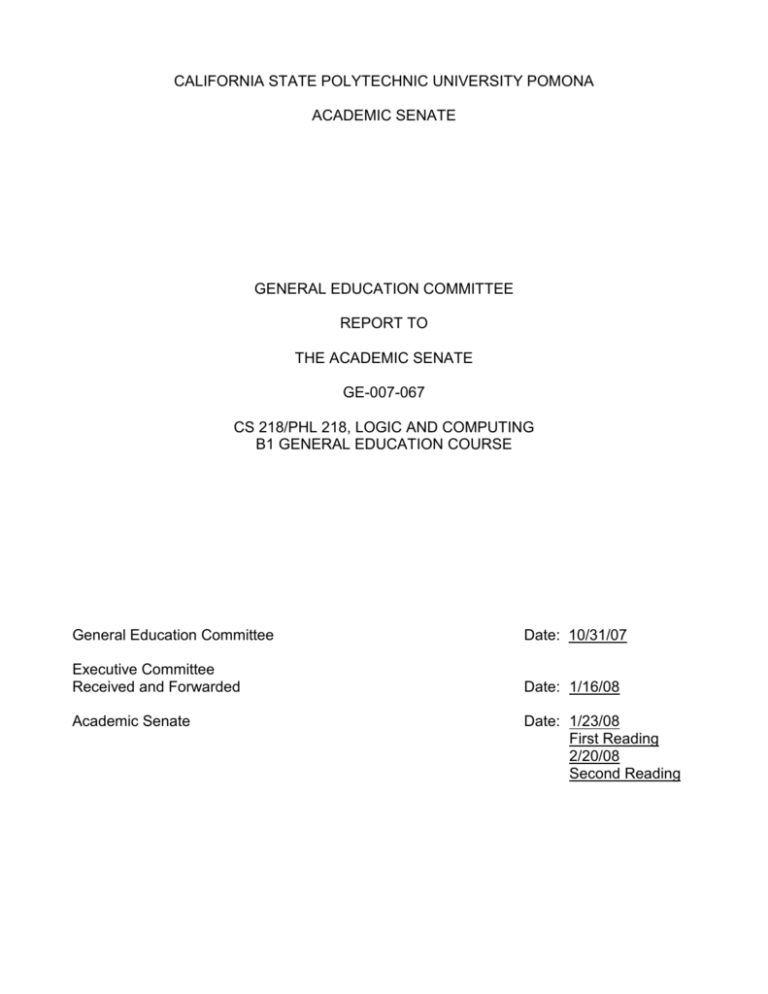
CALIFORNIA STATE POLYTECHNIC UNIVERSITY POMONA ACADEMIC SENATE GENERAL EDUCATION COMMITTEE REPORT TO THE ACADEMIC SENATE GE-007-067 CS 218/PHL 218, LOGIC AND COMPUTING B1 GENERAL EDUCATION COURSE General Education Committee Date: 10/31/07 Executive Committee Received and Forwarded Date: 1/16/08 Academic Senate Date: 1/23/08 First Reading 2/20/08 Second Reading GE-007-067, CS 218/PHL 218, LOGIC AND COMPUTING B1 GENERAL EDUCATION COURSE 2 BACKGROUND: Justification as a B1 General Education course: the Cal Poly Pomona Curriculum Development Guide, Chapter 6, General Education states that “Courses in this area will require the student to use basic mathematical skills to develop mathematical reasoning, investigative and problem solving abilities. Development of these goals will include applications from/to real life situations” (p. 48). The proposed course fits this description in that it helps students learn the concepts of reasoning and problem solving through application of the formal techniques of symbolic logic in making arguments. In addition, since the course stresses analyzing and evaluating natural language arguments--that is, arguments in English –students will gain the skills necessary to apply these techniques in “real life” situations. RESOURCES CONSULTED: Claudia Pinter-Lucke, Associate Vice President for Undergraduate Studies; Amar Raheja, Computer Science Department; Peter Ross, Philosophy Department; Dept. Chair, Computer Science Dept.; Dept. Chair, Philosophy Dept.; Math Department Chair and Faculty; Mandayam Srinivas, Associate Dean of Science and Dale Turner, Associate Dean of CLASS REVISIONS: The committee felt that the ECO was well written and only needed minor modification. In the Evaluation of Outcomes section the headings and sub-headings were restructured to be more appropriate for area B1. RECOMMENDATION: The GE committee unanimously approved the course and now forwards it to the Academic Senate for consideration. GE-007-067, CS 218/PHL 218, LOGIC AND COMPUTING B1 GENERAL EDUCATION COURSE CALIFORNIA STATE POLYTECHNIC UNIVERSITY, POMONA 2006-2007 EXPANDED COURSE OUTLINE Course Title: Course Number: Prepared By: Logic and Computing CS 218/PHL 218 Amar Raheja, Associate Professor, Computer Science Department Peter Ross, Associate Professor, Philosophy Department Date Prepared: Last Date Revised: November 2006 November 14, 2007 I. 3 Catalog Description: CS 218/PHL 218 Logic and Computing (4) Introduction to formal techniques for analyzing and evaluating natural language arguments. Background for historical development of the use of logic in computing. 4 lectures/problem solving. II. Required Background or Experience: None. III. Expected Outcomes: This course will focus on the underlying formal structure of natural language, and techniques for drawing out this formal structure. The course will then make the connection between the historical development of these techniques and the development of the use of algorithms in computer science. Justification as a B1 General Education course: the The Cal Poly Pomona Curriculum Development Guide, Chapter 6, General Education states that courses in area B1 “Courses in this area will require the student to use basic mathematical skills to develop mathematical reasoning, investigative and problem solving abilities. Development of these goals will include applications from/to real life situations” (p. 48). The proposed course fits this description in that it helps students learn the concept of deductive validity through application of the formal techniques of symbolic logic (namely, use of truth tables and natural deduction) to arguments. In addition, since the course emphasizes analyzing and evaluating natural language arguments-that is, arguments in English as opposed to a formal language--it emphasizes application of these formal techniques from/to real life situations. Moreover, Executive Order 595 (General Education-Breadth Requirements) states with respect to courses in area B generally: “Instruction approved for fulfillment of this requirement [of 18 quarter units in area B] is intended to impart knowledge of the facts and principles which form the foundations of living and non-living systems. Such studies should promote understanding and appreciation of the methodologies of science as investigative tools…. In addition, particular attention should be given to the influence which the acquisition of scientific GE-007-067, CS 218/PHL 218, LOGIC AND COMPUTING 4 B1 GENERAL EDUCATION COURSE knowledge has had on the development of the world’s civilizations, not only as expressed in the past but also in present times” (p. 4). The proposed course promotes understanding an appreciation of the methodologies of science as investigative tools in that formal deductive logic is the basis of the hypothetico-deductive method, which provides the standard characterization of the scientific method. In addition, the course’s focus on the impact of formal deductive logic on the development of computer science provides a case study in which the acquisition of scientific knowledge (namely, the development of formal deductive logic in the late 19th and early 20th centuries) has influenced the development of the world’s civilizations. At completion of the course students will be able to: 1. Characterize the fundamental concepts of formal logic. 2. Employ the fundamental techniques for evaluating formal reasoning 3. Characterize the formal/mathematical foundations of computing. IV. Instructional Materials: Possible Core Texts: Patrick J. Hurley, A Concise Introduction to Logic, 9th Edition (Belmont, Cal.: Wadsworth Publishing Co., 2006) Virginia Klenk, Understanding Symbolic Logic, 4th Edition (Upper Saddle River, NJ: Prentice Hall, 2002) R. L. Simpson, Essentials of Symbolic Logic (Vancouver: Broadview Press, 1999) Pratt & Patel, Introduction to Computing Systems, 2nd Edition (McGraw Hill, 2004) Stefano Ceri, Dino Mandrioli, Licia Sbattella, The Art and Craft of Computing (Addison Wesley, 1999) Additional texts: Mi Lu, Arithmetic and Logic in Computer Systems (John Wiley 2004) V. Minimum Student Materials: Course textbook(s); note taking materials VI. Minimum College Facilities: Classroom, whiteboard or chalkboard, suitable for 25+ students. Audio-visual equipment. VII. Course Outline: A. B. C. D. E. The concepts of validity and soundness Truth table techniques for evaluation of validity Translation of natural language arguments into symbolic form Natural deduction techniques for proof of validity Introduction to concept of algorithm GE-007-067, CS 218/PHL 218, LOGIC AND COMPUTING B1 GENERAL EDUCATION COURSE F. Formal logic in algorithms G. Flowchart representation of algorithms H. Overview of simple algorithms like average, search, sort etc. 5 VIII. Instructional Methods: Lecture, example problem solving, student involvement in problem solving. IX. Evaluation of Outcomes: A. Student Assessment for Grading Performance Because of the mathematical nature of the course, encouraging students to write in complete sentences with correct grammar will address the writing component. Student performance will be evaluated by means of the following: A. Weekly homework B. Exams (at least two midterms and a final exam) B. Assessment of Course With respect to the expected outcomes of this course and the goals and objectives of the B1 component of the GE program, student performance will be assessed (by means of the techniques stated below) with regard to the development of mathematical reasoning, including the application of formal techniques to arguments in English. In addition, students will be given a questionnaire at the end of the term which will ask for input as to whether the course has helped them develop their mathematical, investigative and problem solving abilities, as well as whether the course has promoted understanding of the role of formal deductive logic in the development of computer science.
